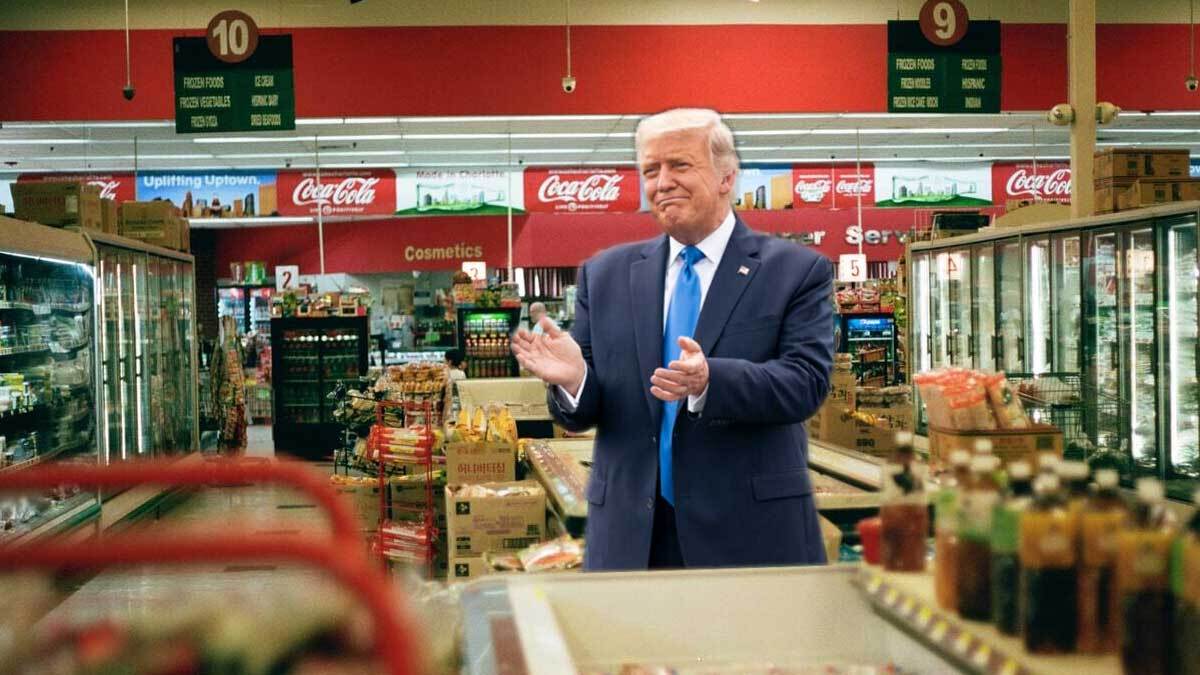How Donald Trump’s Presidency Has Affected Our Food

After a tumultuous and chaotic four years, Donald Trump’s presidential run is coming to an end as Joe Biden assumes the presidency.
Four years of policymaking by the executive branch in that timeline has altered the food landscape in numerous ways. As we take a look back at Trump’s term and what he did to the world of food, we also can see the challenges Biden will have to overcome in that industry and field as he steps into the Oval Office.
Overall, the numbers paint a more bleak picture for how food is made, its cost, and access to nutrition compared to four years ago. Below are some of the ways the food world has changed with Trump at the country’s helm.
The cost of food increased over the last four years, leading to rises in food insecurity

One of the key economic measures folks can look at for the cost of food comes from the Consumer Price Index. That chart shows that the cost of food went up 4% in the last year, and had additional increases ranging from 1.6-1.8% in each year of Trump’s presidency. This is compared to small increases of less than 1 percent, or even decreases, in the cost of food in the years prior.
As the cost of food has climbed, so has food insecurity, or the ability to access food by the general population. Prior to the 2020 pandemic, food insecurity had been dropping, and was at 15.7%. Conditions exacerbated by the lengthening of the pandemic, however, cause food insecurity to double overall, and triple amongst families with children.
As Joe Biden takes office, bringing the cost of food down to help make it affordable, while improving economic livelihoods to decrease food insecurity, will need to be a priority as we emerge from the pandemic in the months to come.
The power of Food Stamps and SNAP has significantly decreased, the program was almost gutted

Food stamps were a program targeted for cuts early on in the Trump Administration, and in 2019, they finally got their wish. Regulations were enacted that restricted the number of people eligible for food stamps, with up to 3.7 million potentially being impacted by the new rules.
While one could argue that an improving economy prior to the pandemic was dropping the number of those enrolled, numbers skyrocketed once COVID-19 hit. 38 million people were on food stamps in 2019, and that number jumped to 43 million in early 2020.
The recent stimulus package passed by Congress did loosen eligibility requirements for food stamps, and benefits were also expanded. In a challenging economy caused by COVID-19, we can expect numbers to go up, but hopefully, as jobs come back, numbers of those who need food assistance will decrease naturally.
Food became more unsafe, less inspected, had more outbreaks and more at risk to more contamination

The FDA under the Trump Administration cut back warning letters sent to facilities by a third, meaning that enforcement and regulatory warnings to help prevent contamination were limited at a similar rate.
The pandemic also led to the suspension of routine inspections of food processing facilities domestic and abroad. The amount of potential fraud and contamination that could arise is alarming, but we have yet to see any measurable data in that regard.
What we have seen, however, is a measurable rise in foodborne pathogen illnesses. Comparing data from 2016-2018 to just 2019, every single one of the eight most common pathogens saw an increase in reported cases. Produce and chicken, which the USDA just allowed to raise processing speeds on, were the most common causes, and even the CDC says that progress in controlling the pathogens has “stalled.”
Increasing food safety inspections is a tough ask to do during a pandemic, given the risk of spreading infection to all of those involved. Improving food safety technology and getting inspections to above normal rates should help in the long run, however.
Racism targeting the food industry rose steadily, but so did pushback

Maybe this was just due to claims made by the president that exacerbated hatred against Asian-American and more specifically, Chinese-American communities, or it could have been increased exposure to incidences on social media. Nonetheless, racism within the food industry was continually exposed over the last 4 years, and during the pandemic, Asian-American business owners were hit hard. They saw a 26 percent drop in business compared to 22 percent for other businesses.
Issues of equity in the food, food media, and restaurant industries are nothing new. But during the Trump presidency, private businesses took it upon themselves to do better, even if the country’s leader was still being blatantly racist towards many groups. Many major firms, including Bon Appetit and the Los Angeles Times, expelled or took corrective actions against those who were racist to others in the company.
Of course, there’s still a long way to go in that regard.
School lunch nutrition, and children’s nutrition in general, took a massive hit

One of the first actions the Trump Administration took was to limit the guidelines set in place by Michelle Obama that improved the quality and nutrition of childrens’ school lunches. The Trump Administration started by allowing for more sodium and flavored milks while decreasing whole grains required for kids.
That was initially rebuffed by a federal judge in 2017, but the Trump Administration continued by limiting the amount of fruits and veggies schools had to serve to kids. The administration is also taking another run at the initial limitations they desired, but a final rule never materialized before Joe Biden’s inauguration.
This comes as labeling requirements to point out added sugars and other changes have been indefinitely delayed, meaning that parents and kids may not have access to all of that info on all products they buy at the store.
Whether the Biden administration chooses to lift that indefinite delay and restore school nutrition policies remains to be seen, though many experts predict it will happen with his first 100 days as president.
Price fixing scandals within the industry have been caught and halted

Across the meat, poultry, and seafood industries, executives have been consolidating and artificially inflating prices. This was proven in both the poultry and seafood industries, where the Department of Justice has levied fines or indicted individuals and companies in both groups.
Companies where employees were charged included StarKist, Bumblebee, Tyson, Pilgrim’s Pride, and Claxton Poultry Farms.
The Trump Administration is also actively investigating the meat/beef industry, although no charges or fines have yet to be levied. The investigations that the Justice Department started will continue and be handed over to Biden Administration officials.
Farmers are relying on the government more than ever to survive: well, big farmers at least

The government has long been subsidizing farmers to help keep the costs of produce down. Due to Trump’s trade war with China that sharply elevated prices, that amount of subsidy increased, to the amount where farmers could be getting up to 40 percent of their income from the government. That’s not sustainable for a business to survive on in the long run.
What makes matters worse is that most of that funding is being used to subsidize major farm and production corporations, rather than small farms. Two-thirds of the above payments went to the top 10 producers, while small farms and those with diversified operations were largely shut out.
This all comes as the country continues to see an exodus of small farms that has continued over the past 40 years. While small farms used to constitute half of all farming in the 1980s, they now only consist of just a fourth of farming. Over 1,000 dairy farms have also closed in just the past year in Wisconsin, and even agriculture secretary Sonny Perdue acknowledged the issue, saying “In America, the big get bigger and the small go out.”
Could the United States go further and privatize farming to guarantee incomes? Or will improved trade deals and economic conditions mean that they will have to help farmers less? That’s something the Biden Administration may have to decide in the coming years as they navigate issues surrounding farmers, including climate change and the current trade war with China.
GMOs got updated labeling requirements, but new nutrition labels have yet to be enforced

Good news, America: You’ll now be able to see if a product contains GMOs based on labels that were passed into law in 2019. President Obama signed the requirements into law in 2016, and the industry is starting to have to comply, with everyone needing labels by 2022.
Bad news, though: the updated nutrition label laws that show added sugars, make calories bigger, and implement other changes that are required at restaurant chains, are indefinitely delayed. While many companies took it upon themselves to institute the changes anyway, the Trump Administration chose to keep pushing the enforcement date back on them. Eventually, they chose to just indefinitely delay it in response to pressure from trade groups.
Biden may choose to end that delay and push them into effect, which would bring everyone up to date on nutrition labelling nearly 5 years after legislation was passed requiring them. Industry lobbyists, however, could still prevail.






















